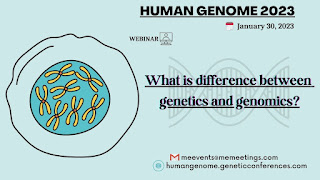What is difference between genetics and genomics?

Genetics is the study of genes and how they affect heredity, or how specific characteristics or disorders are passed down from one generation to the next. The scientific study of genes and their effects is known as genetics. Protein-making instructions, which are carried by genes, control how cells behave and how the body works. Cystic fibrosis, Huntington's disease, and phenylketonuria are a few examples of hereditary or genetic illnesses. Genomics is a more recent term that describes the study of all of a person's genes, including relations of those genes with each other and with the person’s terrain. Genomics includes the scientific study of complex conditions similar as heart complaint, asthma, diabetes, and cancer because these conditions are generally caused more by a combination of inheritable and environmental factors than by individual genes. Genomics is offering new possibilities for curatives and treatments for some complex conditions, as well as new individual sty...

